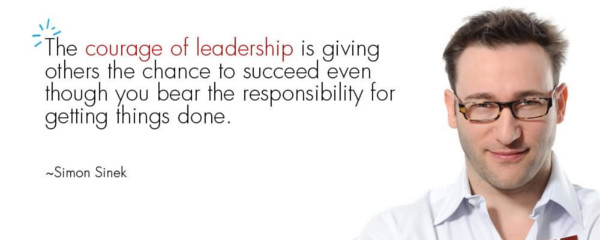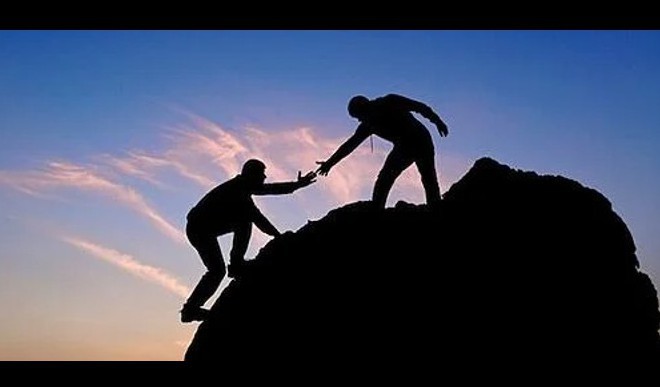Captain William Swenson, who was awarded the Congressional Medal of Honor for running into live fire to save his wounded soldiers and pull out the dead.
Impressed by such sacrifice, Simon wondered what it is that makes people capable of such acts. Initially, he thought maybe they were just born better people, attracted to the military because of the concept of ‘service’. However, after meeting some of these heroes, he discovered that it’s actually the environment that makes us capable of doing remarkable things.
When asked ‘Why did you do it?’, they replied ‘Because they would have done it for me.’
It’s a deep sense of trust and cooperation, and this is where the role of a leader is important.
‘In the military, they give medals to people who are willing to sacrifice themselves so that others may gain. In business, we give bonuses to people who are willing to sacrifice others so that we may gain. We have it backwards.’
The Leader sets the tone
Simon explains that given the correct environment, people naturally end up trusting each other and cooperating. We evolved this way to protect ourselves from danger, and in modern-day, it’s no different. There is still danger (market conditions, new tech, competition), and we only have control over the conditions inside the organization.
If we feel safe, we will combine our strengths to work together. If not, we will spend our energy protecting ourselves from each other, which doesn’t lead to positive results.
And the leader sets the tone, it’s up to the leader to create this environment. So, what makes a good leader?
Simon makes the analogy that being a true leader is like being a good parent: a parent wants to give their child the opportunities to grow, and that’s exactly how a leader should think: they should help their people grow, build their self-confidence, and give them opportunities to try, fail, and learn.
Great leaders would rather sacrifice the numbers than the people. And Simon describes that when a leader puts the lives of their people first, sacrificing their own comfort and results, they make them feel safe and enable them to in turn do exceptional things.

Here are two examples that embody this value:
- Charlie Kim, CEO of a Next Jump, implemented a policy of lifetime employment. He explained that a parent wouldn’t ever consider laying off a child even if the family was going through hard times. So, employees couldn’t get fired for performance issues. Instead, they would get support and coaching.
- Bob Chapman, who ran a large manufacturing company, had to make a hard decision when the 2008 recession hit. The company discussed layoffs, and Bob refused. Instead, his solution was for every single employee to take 4 weeks of unpaid vacation, because ‘it’s better that we should all suffer a little, than any of us to suffer a lot.’ Not only did the company save more money than expected, but people also started cooperating to help each other.
People do what authority says because they have to. But they would only follow a true leader.
Any professional, whether senior management, junior management, or a regular employee can adopt the characteristics of a good leader: it’s all about looking after people and putting them first so that they feel safe. And then, great things can happen:
‘They will give us their blood and sweat and tears to see that their leader’s vision comes to life,
and when we ask them: why would you do that?
They all say the same thing: because they would have done it for me.’





Thanks for sharing. I read many of your blog posts, cool, your blog is very good.
Thanks for sharing. I read many of your blog posts, cool, your blog is very good.
Your point of view caught my eye and was very interesting. Thanks. I have a question for you.
Your article helped me a lot, is there any more related content? Thanks!